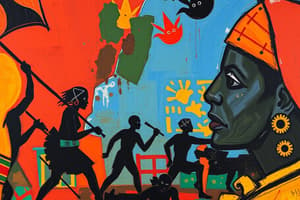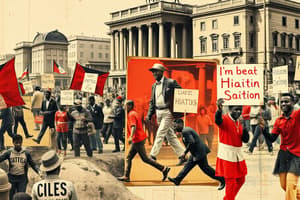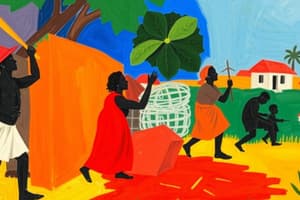Podcast
Questions and Answers
What was the primary outcome of the Haitian Revolution?
What was the primary outcome of the Haitian Revolution?
- Establishment of a French colony
- Introduction of democratic principles in Europe
- End of the Atlantic slave trade
- Formation of the world's first Black republic (correct)
Which foundational document inspired the people of Saint-Domingue during the revolution?
Which foundational document inspired the people of Saint-Domingue during the revolution?
- Declaration of the Rights of Man and of the Citizen (correct)
- Bill of Rights
- Magna Carta
- Constitution of the United States
Who led the final battle that resulted in the victory for the enslaved people?
Who led the final battle that resulted in the victory for the enslaved people?
- Napoleon Bonaparte
- Jean-Jacques Dessalines (correct)
- Toussaint Louverture
- Henri Christophe
What was the status of Saint-Domingue's population prior to the revolution?
What was the status of Saint-Domingue's population prior to the revolution?
In what year did the Haitian Revolution begin?
In what year did the Haitian Revolution begin?
Which of the following statements is true about Haiti's independence?
Which of the following statements is true about Haiti's independence?
What was one of the main economic products of Saint-Domingue during the 18th century?
What was one of the main economic products of Saint-Domingue during the 18th century?
What significant event did Napoleon Bonaparte attempt during the revolution?
What significant event did Napoleon Bonaparte attempt during the revolution?
What significant event started the first enslaved uprising in the colony?
What significant event started the first enslaved uprising in the colony?
Which group among the Black population held considerable social and economic status?
Which group among the Black population held considerable social and economic status?
What was a key action taken by Léger-Félicité Sonthonax during the revolution?
What was a key action taken by Léger-Félicité Sonthonax during the revolution?
Who faced resistance from the white community during the revolution?
Who faced resistance from the white community during the revolution?
What result did the alliance between Sonthonax and the enslaved people achieve?
What result did the alliance between Sonthonax and the enslaved people achieve?
Which faction among the Black population was NOT involved in vying for freedom at the start of the civil war?
Which faction among the Black population was NOT involved in vying for freedom at the start of the civil war?
How did the National Convention respond once it learned about the abolition of slavery in Saint-Domingue?
How did the National Convention respond once it learned about the abolition of slavery in Saint-Domingue?
Which of the following statements about the enslaved population in Saint-Domingue is correct?
Which of the following statements about the enslaved population in Saint-Domingue is correct?
What position was Toussaint Louverture appointed to in 1797?
What position was Toussaint Louverture appointed to in 1797?
What method did Louverture initially use to integrate formerly enslaved people into society?
What method did Louverture initially use to integrate formerly enslaved people into society?
Which battle showcased the fighting abilities of the enslaved people led by Louverture?
Which battle showcased the fighting abilities of the enslaved people led by Louverture?
Why did Louverture distrust Napoleon Bonaparte?
Why did Louverture distrust Napoleon Bonaparte?
What was a major consequence of the revolution for the colonies’ infrastructure?
What was a major consequence of the revolution for the colonies’ infrastructure?
Who led the enslaved people in guerrilla tactics against the French forces after Louverture's capture?
Who led the enslaved people in guerrilla tactics against the French forces after Louverture's capture?
What action did Napoleon take in response to Louverture's independence?
What action did Napoleon take in response to Louverture's independence?
What was one challenge faced in integrating formerly enslaved people into society?
What was one challenge faced in integrating formerly enslaved people into society?
What was one of the fundamental principles stated in the Declaration of the Rights of Man and of the Citizen?
What was one of the fundamental principles stated in the Declaration of the Rights of Man and of the Citizen?
Who was Vincent Ogé and what role did he play during the French Revolution?
Who was Vincent Ogé and what role did he play during the French Revolution?
What action did the Assembly in Paris take in May 1791 concerning free Black people?
What action did the Assembly in Paris take in May 1791 concerning free Black people?
What was the primary outcome of Vincent Ogé's uprising in Saint-Domingue?
What was the primary outcome of Vincent Ogé's uprising in Saint-Domingue?
How did the mixed-race population of Saint-Domingue respond to the political turmoil?
How did the mixed-race population of Saint-Domingue respond to the political turmoil?
What was the attitude of the white population in France regarding the rights of free Black people?
What was the attitude of the white population in France regarding the rights of free Black people?
How did Britain and Spain react to the situation in Saint-Domingue during the revolution?
How did Britain and Spain react to the situation in Saint-Domingue during the revolution?
What effect did the principles of the French Revolution have on the enslaved community in Saint-Domingue?
What effect did the principles of the French Revolution have on the enslaved community in Saint-Domingue?
What was one major challenge Haiti faced shortly after becoming a country?
What was one major challenge Haiti faced shortly after becoming a country?
What monetary amount did France demand from Haiti as 'reparations' in 1825?
What monetary amount did France demand from Haiti as 'reparations' in 1825?
How did Haiti initially respond to France's threats of invasion?
How did Haiti initially respond to France's threats of invasion?
What long-term economic impact did the reparations payment have on Haiti?
What long-term economic impact did the reparations payment have on Haiti?
What effect did the revolution in Saint-Domingue have on Haiti's recognition by external powers?
What effect did the revolution in Saint-Domingue have on Haiti's recognition by external powers?
Flashcards are hidden until you start studying
Study Notes
Haitian Revolution
- The Haitian Revolution (1791-1804) was a successful colonial uprising that led to the formation of the world's first Black republic.
- The French Revolution (1789-1799) and its Declaration of the Rights of Man and of the Citizen (1793) inspired the people of Saint-Domingue (Haiti) to fight for freedom and equality.
- Saint-Domingue's population was diverse, with rich white people, poor white people, free Black people, and enslaved people.
- The initial conflict was between white people and free Black people.
- In 1791, enslaved people rose up in rebellion.
- Emancipation came for some enslaved people in 1793, but conflicts continued until 1804.
- Napoleon attempted to retake Saint-Domingue in 1802.
- Jean-Jacques Dessalines led the enslaved people to victory, resulting in the independence of Haiti.
Background
- Saint-Domingue was known as the "Pearl of the Antilles" and was a highly profitable source of coffee, sugar, indigo, and cotton.
- Production relied on a large population of enslaved Africans brought to Haiti through the Atlantic slave trade.
- The French Revolution's ideals of freedom and individual rights reached the people of Saint-Domingue, inspiring both Black and white populations to rebel against France.
- The Declaration of the Rights of Man and of the Citizen (1793) declared people had basic "natural and inalienable rights," including the right to liberty and the right to resist oppression.
- Vincent Ogé, a free Haitian mulatto, advocated for free Black people to have the same rights as white people in Paris in 1789.
- Ogé returned to Saint-Domingue and coordinated an uprising in 1790, which was suppressed by white factions.
- In May 1791, the National Assembly in Paris declared that free Black people born to free parents had the same rights as white people.
- This decree led to more fighting between white people and free Black people.
- Britain and Spain sought to exploit the turmoil in Saint-Domingue, wanting to take control of the wealthy colony.
Rebellion
- Enslaved people began their uprising in 1791.
- The Black and white populations had different political interests: white people wanted to be recognized as French citizens, while Black people were divided on French citizenship.
- Saint-Domingue's Black population consisted of enslaved people, Maroons (runaways), and freed slaves (about half of whom were mixed race).
- Many freed Black people held considerable social and economic status and were richer than many lower-class white people.
- The enslaved people, making up the majority of the population, overwhelmed the tripartite civil war among the freed Black population, planters, and petit blancs.
- Léger-Félicité Sonthonax, the new civil commissioner in Saint-Domingue, was a revolutionary who removed royalists from power and replaced them with free Black men.
- To gain support, Sonthonax made an agreement with enslaved people to free them if they fought on the side of the revolutionaries.
- This agreement led to the abolition of slavery in Saint-Domingue by the end of 1793.
- The National Convention in Paris ratified the abolition of slavery and declared all formerly enslaved people citizens of France.
Toussaint Louverture and the French Response
- Toussaint Louverture, a charismatic, formerly enslaved person, led the enslaved people in overwhelming the colony's white minority.
- Louverture served France's interests by expelling the Spanish and British who sought to exploit the chaos for their own gain.
- Louverture was appointed governor of the colony in 1797.
- The revolution destroyed much of the island's infrastructure, including plantations.
- Louverture required formerly enslaved people to continue working on plantations in exchange for wages.
- Louverture faced resentment for not allowing formerly enslaved people to easily acquire land and started conscripting them into an unofficial military regiment.
- By 1801, Louverture declared himself governor-general for life.
- Napoleon Bonaparte's rise to power in 1799 led to frustration with Louverture's independence.
- Napoleon sent General Charles Leclerc to invade Saint-Domingue in 1801.
- Louverture resisted, fearing the reintroduction of slavery.
- In the Battle of Crête-à-Pierrot, enslaved people showcased their fighting abilities.
- French forces overwhelmed Louverture's military, capturing and imprisoning him in 1803.
Haitian Independence
- Disease decimated Napoleon's forces.
- Jean-Jacques Dessalines, a formerly enslaved person and leader at Crête-à-Pierrot, employed guerrilla tactics against the French army.
- With news of France's plan to reinstitute slavery, more formerly enslaved people joined the fight.
- In 1804, Haiti became independent.
- Haiti's early years were chaotic, with three different constitutions in its first three years.
- Dessalines was assassinated in 1806, leading to the split of the country into two republics.
- The country reunified in 1820.
Aftermath
- Europe refused to recognize Haiti as a nation.
- The revolution's devastation of plantations hindered Haiti's economic development.
- In 1825, France demanded 150 million francs in reparations from Haiti.
- Due to economic fragility and lack of support, Haiti agreed to pay the "reparations" through a loan, which took 64 years to pay off.
- This loan cost Haiti an estimated 21billionto21 billion to 21billionto115 billion in lost economic growth.
- The Haitian Revolution had significant historical impact, but Haiti has faced economic and political challenges since its independence.
Studying That Suits You
Use AI to generate personalized quizzes and flashcards to suit your learning preferences.




